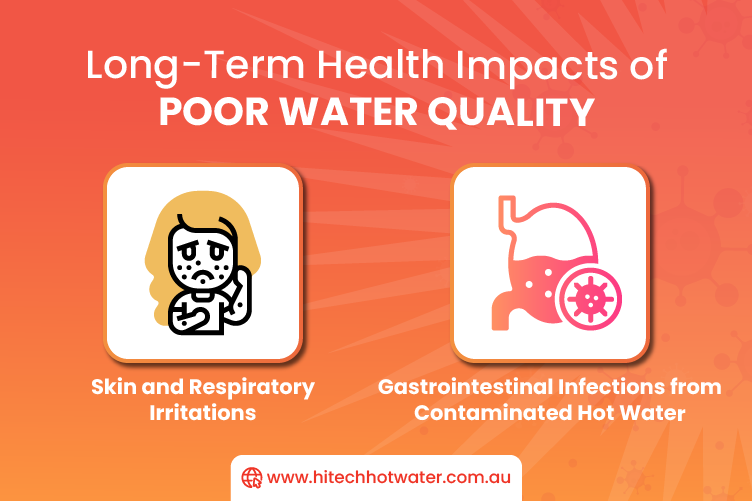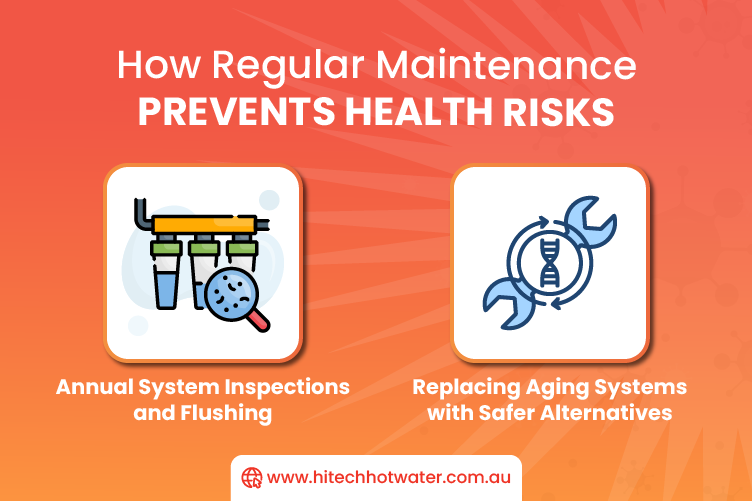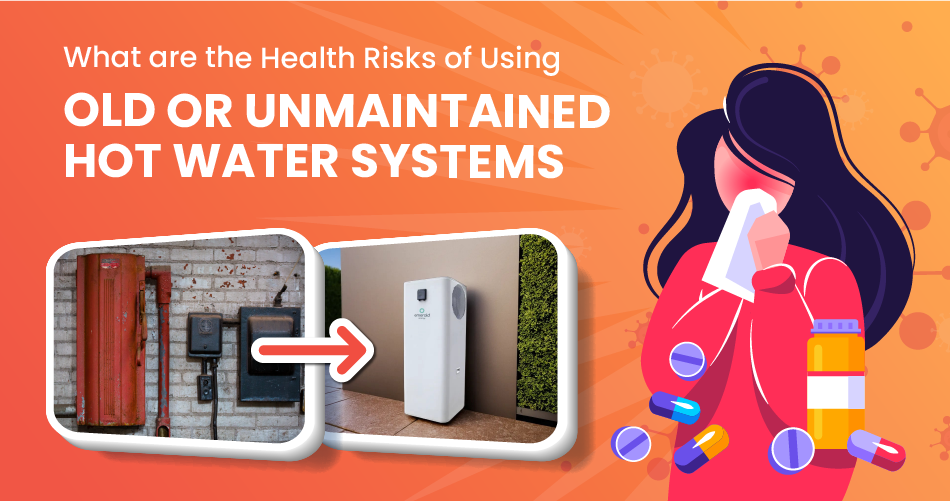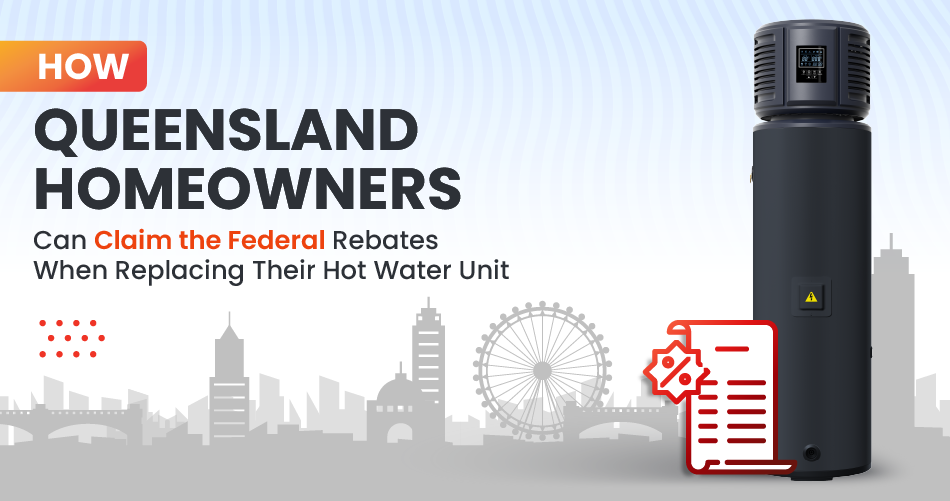Hot water systems are a staple in every home - but when left old or unmaintained, they can pose serious health and safety risks. From harmful bacteria and rust to inconsistent temperatures, these systems can impact more than just your comfort. In this blog, we explore the hidden hot water system health risks and why maintaining or upgrading your unit is essential for your family's well-being.
Why Old or Poorly Maintained Hot Water Systems Can Be Dangerous
Hot water systems are essential for modern living - providing comfort, hygiene, and functionality. But when these systems age or go without proper care, they can pose serious health and safety threats to you and your family.
From harmful bacteria to scalding water and contaminated supply, the dangers are often overlooked until symptoms or damage become apparent. In this blog, we explore the hot water system health risks associated with outdated or neglected units, and why prioritising heat pump hot water safety is a smart move for Australian homeowners.
Potential Safety and Performance Issues
Older or unmaintained hot water systems can deteriorate from the inside out. Internal components such as thermostats, heating elements, anode rods, and tanks may malfunction, resulting in unsafe temperature fluctuations, mineral buildup, or water contamination.
Performance also degrades over time-hot water delivery becomes slower, inconsistent, or completely fails, increasing your reliance on temporary fixes rather than long-term solutions.
Accumulation of Harmful Bacteria
One of the most dangerous old hot water heater dangers is the growth of Legionella bacteria, which thrives in warm, stagnant water - especially in tanks not regularly flushed or kept at consistent temperatures.
Legionella can cause Legionnaires' disease, a potentially fatal form of pneumonia, particularly in people with compromised immune systems.
Inconsistent Water Temperature and Scalding Risks
Aging systems often suffer from erratic thermostats or damaged heating elements. These issues can lead to unexpected spikes in water temperature, increasing the risk of burns or scalds.
This is particularly concerning in households with children or elderly residents. Without regular maintenance, systems may lose the ability to properly regulate and deliver safe water temperatures, turning a basic shower into a potential hazard.
Rust, Corrosion, and Contaminated Water
Over time, rust and corrosion can eat away at the internal lining of hot water tanks, contaminating the water supply. This not only causes foul-tasting or discoloured water but may also irritate the skin and damage household plumbing.
Iron, copper, and other metals released into the water can accelerate the wear and tear of fixtures and appliances. These are common hot water system health risks that often go unnoticed until repairs become unavoidable.
Long-Term Health Impacts of Poor Water Quality

Even minor water quality issues can have cumulative effects on your health. Let's take a closer look:
Skin and Respiratory Irritations
Using water contaminated with rust or bacteria can cause skin issues such as dryness, rashes, or eczema. Inhaling vapour from poorly maintained systems, especially in enclosed bathrooms, may also contribute to respiratory issues like asthma or allergic reactions.
Gastrointestinal Infections from Contaminated Hot Water
If contaminated hot water comes into contact with drinking supplies (due to cross-connections or leaks), there's a risk of consuming water tainted by bacteria or heavy metals. This can lead to stomach infections, nausea, diarrhoea, and other gastrointestinal issues-especially in vulnerable individuals.
High-Risk Groups: Who's Most Vulnerable?
Certain demographics are more susceptible to the dangers posed by outdated or unmaintained hot water systems.
Seniors and Immunocompromised Individuals
Older adults and people with weakened immune systems are at a significantly higher risk of contracting illnesses from waterborne bacteria like Legionella. For them, even mild infections can lead to serious health complications.
Children and Infants
Young children have thinner skin and underdeveloped immune systems, making them more vulnerable to scalding injuries and bacterial exposure. Maintaining hot water safety is especially important in households with infants or toddlers.
How Regular Maintenance Prevents Health Risks

Routine servicing is the most effective way to mitigate the risks associated with an old hot water heater. Here's how:
Annual System Inspections and Flushing
Having your system professionally inspected and flushed once a year helps remove mineral deposits, sludge, and bacteria. Technicians also check for leaks, faulty thermostats, and signs of corrosion-ensuring early intervention before issues escalate.
Replacing Aging Systems with Safer Alternatives
If your system is more than 10–12 years old, consider replacing it with a modern eco-friendly hot water system like a heat pump. Heat pumps not only reduce health risks by maintaining precise temperatures and minimising bacteria growth, but they also lower running costs and environmental impact.
When Should You Replace Your Hot Water System?
General Lifespan Guidelines
Most storage hot water systems have a lifespan of 10–15 years. Beyond this point, the risk of breakdowns, inefficiency, and health hazards increases. Hot water system like heat pumps generally last longer (up to 15–20 years) with proper maintenance.
Signs It's Time for an Upgrade
- Water discolouration or strange odour
- Fluctuating water temperatures
- Increased energy bills
- Frequent leaks or repairs
- Noisy operation
- Reduced water pressure or output
These symptoms may indicate that your system is no longer safe or cost-effective to operate.

Conclusion
Old or poorly maintained systems are more than just an inconvenience-they're a real health concern. From scalding risks and bacteria growth to rust contamination and respiratory irritants, the list of hot water system health risks continues to grow with time. Regular maintenance, timely upgrades, and choosing modern solutions like heat pumps are the keys to ensuring both safety and performance.






